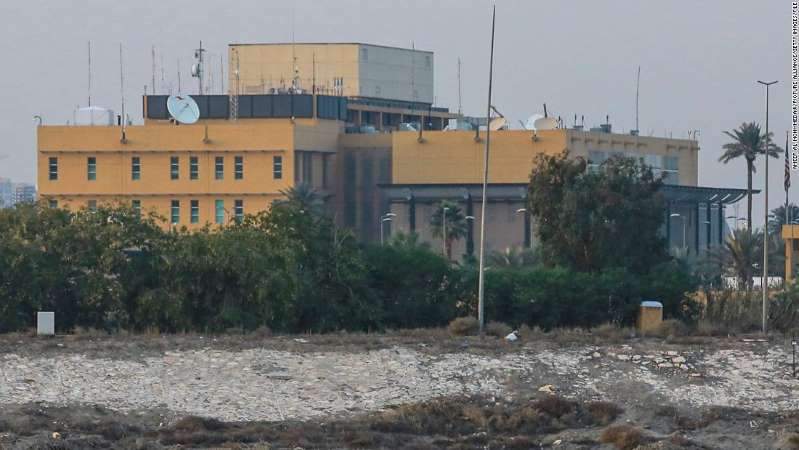US embassy attack: Rockets strike embassy compound in Baghdad

Three rockets struck the US Embassy compound in Baghdad on Sunday, leaving one person injured, a US official told CNN initial reports indicate.
The official said the injury was minor and the individual had since returned to duty.
A State Department spokesperson said Sunday evening that they "are aware of reports of rockets landing in the International Zone," but did not address the US embassy itself. The State Department did not respond to a query as to whether any embassy employees were injured.
"We call on the Government of Iraq to fulfill its obligations to protect our diplomatic facilities," the spokesperson said.
The State Department did not directly blame Tehran for the rocket strikes in the Iraqi capital, but the spokesperson's statement made reference to Iranian threats in the region and past attacks by Iranian-backed militias on US interests. There was no immediate claim of responsibility for the attack.
"The security situation remains tense and Iranian-backed armed groups remain a threat. So, we remain vigilant," the spokesperson said. Since September there have been more than 14 attacks by Iran and Iranian-supported militias on US personnel in Iraq, according to the State Department.
The spokesperson said the State Department would not comment further on the security situation in Baghdad.
Rep. Michael McCaul, the lead Republican on the House Foreign Affairs committee, said in a tweet Sunday that he is "closely monitoring reports of a rocket attack targeting the U.S. Embassy in Baghdad."
"Violent acts against our diplomatic facilities are simply unacceptable. We must ensure the safety of American diplomats, troops and other Americans in Iraq."
Adil Abdul Mahdi, the prime minister of Iraq, condemned the attack and said Iraqi forces have been ordered to "deploy, search, and investigate to prevent the recurrence of such attacks, and to arrest those who launched these rockets so that they can be punished."
The Prime Minister said the Iraqi government is "committed to protecting all diplomatic missions and taking all necessary measures to achieve this."
Earlier this month, the embassy was the site of mass protests in response to US airstrikes on an Iranian-backed militia group at the end of December.Those strikes were launched in retaliation to attacks by an Iranian-backed Shia militia group known as Kataib Hezbollah, which had injured numerous American military personnel, according to US officials.
The embassy is in Baghdad's Green Zone where the embassies of the US and several other western countries are located. It was initially carved out of central Baghdad by US-led forces after their invasion of Iraq in 2003 and is largely viewed as a safe location, despite frequently being the target of rocket attacks.
There have been numerous rocket attacks on the Green Zone and the area surrounding it in recent months. However, the whole of Iraq is on a heightened state of alert as tensions between the US and Iran have dramatically increased in recent weeks.
On Friday the Pentagon revealed that 34 US service members have been diagnosed with traumatic brain injuries following an Iranian missile attack on US forces in Iraq earlier this month.
The Iranian attack was a response to the US killing of key Iranian general Qasem Soleimani in a drone strike at Baghdad International airport.
Photo: © Ameer Al Mohmmedaw/picture alliance/Getty Images/FILE A general view of the U.S. Embassy compound.











